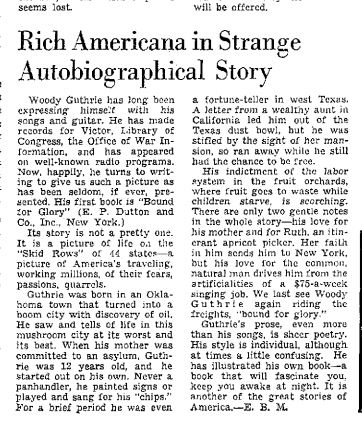Woody Guthrie is an iconic folk singer and performer in American history. Most famously known for his performances of “This Land is Your Land,” Guthrie traveled the United States through the 40’s and 50’s singing anything from traditional folk music to anti-fascist songs about Hitler. However, I would guess that very few people would mention him as a prolific writer, or perhaps know that he wrote an autobiography (bonus points for those of you who did know).
This newspaper clipping (the rest of the issue found here) comes from the Salt Lake Tribune in its May 30th, 1943 publication. The author of the article, initialed E.B.M., writes a sort of review or advertisement for Guthrie’s Bound for Glory, his autobiography published earlier that year. Acknowledging his musical prowess, she tries to draw the reader’s attention to “a book that will fascinate you, keep you awake at night.” She even goes on to call it “another of the great stories of America.” The autobiography itself details his life of travels through 44 of the United States. It tells a sad story of Guthrie starting out on his own at the age of 12 when his mother was placed in an asylum. Never resorting to begging, he painted signs or played music and sang for the money he earned. His story claims that he was even a fortune-teller in Texas at one point. E.B.M strongly points out Guthrie’s aversion to riches, quoting parts of his story when he ran away from his aunt (who led him out of the Texas dustbowl) after seeing her mansion, and how he left his $75 per week singing job in New York.
So why is this all important? The answer to that question lies in the ideals of folk music. As folk expert and Folkway Records founder Moses Asch explains, “folk means people, and this in turn means all of us, folk represents all of us.”1 This is what connects Woody Guthrie’s music, but also importantly his story, to the rest of us people. Asch goes on to say that “folk expressions are…so identified with the people who use them that they express conscious and subconscious feelings and experiences.”2 Guthrie’s story is that of a common man’s identity in folk — the story of a young, poor, boy who finds his life in music. Turning away (at least he claims) from fame and riches for the authenticity of folk ideals, his story can indeed represent all of us. Even without fame or riches, we can tell our own story, a book “bound” with glory.
1 Asch, Moses. “Folk Music.” Notes. Second Series, Vol. 14, No. 1 (Dec., 1956) , pp. 29-32. Music Library Association. Accessed March 2, 2015, http://www.jstor.org/stable/891896


Great post, S. I particularly like how you put this 1943 review in conversation with Moses Asch’s later pronouncements about what “folk” means. (By the way, don’t forget to provide a full citation at the end for the 1943 review. I clicked on the link but it didn’t seem to work, which is why it’s important to include a citation even if it seems redundant.)
As I mentioned in class, I think you could put some critical pressure on both primary sources. The review is celebrating Guthrie’s folkiness at a time when he was actually establishing himself in New York, settling down with a family, and starting to achieve financial success as well as real notoriety. Asch, too, has a stake in gesturing towards what’s “authentic” about folk music, even as he’s participating in the process of transforming the genre into a popular, commercial one.
Finally, relating to nothing in particular, the title of Guthrie’s autobiography is a reference to a gospel song written in the early 20th century and popularized by the Lomaxes. It became widely known during the 1960s folk revival and was covered by lots of people (including Rosetta Sharpe, Johnny Cash, and most recently, Mumford and Sons). It might be need to include an archival recording of the song, even though it’s not a Guthrie song, because it’s clear he found the song important. I couldn’t find one through National Jukebox, but maybe DRAM or the American Song collection would have it.